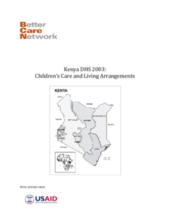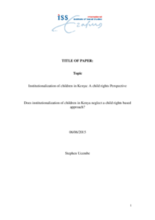This country page features an interactive, icon-based data dashboard providing a national-level overview of the status of children’s care and care reform efforts (a “Country Care Snapshot”), along with a list of resources and organizations in the country.
demographic_data
childrens_living_arrangement
children_living_without_bio
adoption
social_work_force
key_stakeholders
Key Stakeholders
Add New DataOther Relevant Reforms
Add New Datadrivers_of_institutionalisation
Drivers of Institutionaliziation
Add New Datakey_research_and_information
Key Data Sources
Add New DataChildren's Act, 2022 (Kenya)
Prevalence and number of children living in institutional care: global, regional, and country estimates
Social Protection and Disability in Kenya
Kenya Social Protection Sector Review
Country Care Review: Kenya
Child Developmental Disabilities, Caregivers’ Role in Kenya and Its Implications on Global Migration
Research findings on Alternative care system in Kenya for children without parental care
Charitable Children Institutions in Kenya: Factors Influencing Institutionalization of Children
Acknowledgements
Data for this country care snapshot was contributed by consultants with Maestral International.
Displaying 371 - 380 of 447
This country brief provides an overview of data on children’s living arrangements in Kenya, extracted from the 2003 DHS survey.
This article describes the so-called “orphan industrial complex” and the ways in which it harms children, families, and communities in the Global South.
PAN is embarking on an evaluation on the efficacy of Group Triple P methodology as a parenting training approach, in the African context. PAN is looking for consultants with the capacity to undertake the entire evaluation.
A 20 year-old man from the United States, Matthew Lane Durham, has been convicted of sexually abusing children at a children’s home in Kiambu County, Kenya, where he was volunteering.
This essay examines institutional care not as a structure or facility, but as a model of care and protection for orphans and vulnerable children in Kenya.
This document, developed through a mapping exercise conducted by the National Council for Children’s Services (NCCS) and the Department of Children Services (DCS) of Kenya, provides a comprehensive list of the agencies and programs in Kenya that provide services for children.
This paper examines alternative care in Kenya. The focus will be on the genesis of alternative care; the non- prosaic multiple factors contributing to the situation, situational analysis on data, and child protection frameworks.
The organizations profiled in these case studies have pioneered effective transitions from residential to family-based care.
This study sought to understand gender differences in potentially traumatic events (PTEs) in orphaned and separated children in 5 low- and middle-income countries (LMIC): Cambodia, Ethiopia, India, Kenya and Tanzania.
This video features Boniface Mwangi, a Kenyan photojournalist and activist, as he speaks with students and volunteers in the United States about international volunteering.




